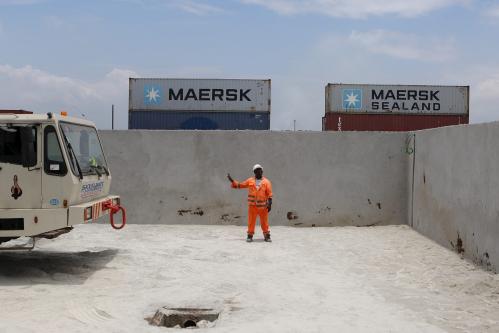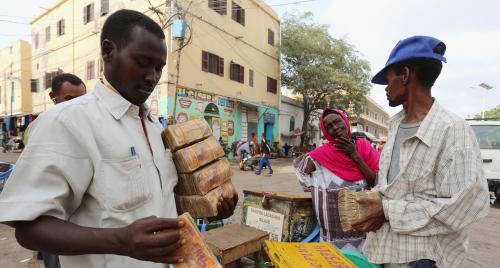Africans react to offensive remarks by US President Trump
This week, in the wake of derogatory remarks by President Donald Trump about African countries, Africans and their leaders have reacted strongly with outrage and disappointment. The African Union promptly released a statement demanding an apology, adding, “The African Union Mission wishes to express its infuriation, disappointment, and outrage over the unfortunate comment made by Mr. Donald Trump, the President of the United States of America, which remarks dishonor the celebrated American creed and respect for diversity and human dignity.” The United Nations human rights office labelled the remarks “shocking and shameful.” South Africa and Nigeria summoned American diplomats stationed in their countries, demanding an explanation for the comments. Botswana has called the remarks “irresponsible, reprehensible, and racist,” and cheekily demanded clarification on whether Botswana is included in his insulting characterization. Notably, The Daily Nation reported that the Kenyan government, while it supports the African Union’s statement, “has no problem with the obscene word” used by Trump as the comments “were not official government-to-government communication,” also emphasizing that the remarks were not directed at Kenya.
The consequences of the remarks will likely go beyond these statements of outrage. The New York Times reported: Former U.S. Ambassador to South Africa Patrick Gaspard stated that “progress on trade, public health, security and education, among many areas, had been ‘thrown into question by the irresponsible and vulgar comments made by the president.’” Similarly, former NATO Ambassador R. Nicolas Burns noted, “The blow to U.S. credibility is real and long-lasting.” Peter Lewis, Director of African Studies at Johns Hopkins University’s School of Advanced International Studies, has said that the remarks have undermined 25 years of improving relations with the continent, adding, “I don’t think this will just blow over…I think it fundamentally poisons the relationship with numerous countries.”
So far, the White House has denied the specific phrasing and has not issued an apology. At the same time, some American lawmakers have made steps towards better relations with the continent, as the U.S. House of Representatives passed the African Growth & Opportunity Act (AGOA) and Millennium Challenge Act (MCA) Modernization Act unanimously. According to the House press release, the law “will make AGOA more effective by directing the president to establish a website with information regarding AGOA and by encouraging embassies in chosen countries to promote export opportunities to the United States.”
The African Development Bank releases its annual African Economic Outlook
On Wednesday, the African Development Bank launched its annual flagship report, the African Economic Outlook (AEO) at its Abidjan headquarters. The report gives “short- to medium-term forecasts on the evolution of key macroeconomic indicators.” The report finds that real output growth noticeably improved to 3.6 percent in 2017 up from 2.2 percent in 2016, and is set to improve further in 2018 to 4.1 percent. Moreover, African countries are increasingly resilient and able to deal with negative shocks. The report attributes these improvements to good macroeconomic policies, improved structural reforms, and a sensible policy framework. Additionally, controlling for the level of per capita income, tax revenues in some African countries are higher than in similar Latin American countries.
Nevertheless, certain macroeconomic challenges remain. Since early 2015, most African currencies—with the exception of the CFA franc, which is pegged to the euro—have lost 20-40 percent of their value against the U.S. dollar. External debt ratios are also rising across the region. Despite output growth, employment has only increased at half the rate of that growth. The report urges countries to focus on tax reform and improve revenue regimes. Moreover, the report states that African countries’ macroeconomic policy strategies should combine real exchange rate adjustment, domestic revenue mobilization, and sensible demand management.
This year’s report focuses on financing infrastructure in Africa and during the launch, President Adesina stated that infrastructure projects are “among the most profitable investments any society can make” as they “significantly contribute to, propel, and sustain a country’s economic growth. Infrastructure, when well-managed, provides the financial resources to do everything else.” The report suggests that attracting a small fraction of the $100 trillion in assets managed by institutional investors would be enough to plug Africa’s infrastructure financing gap.
Nigeria releases 244 Boko Haram suspects and Ethiopia releases opposition leader
On Monday, January 15, the Nigerian army transferred 244 Boko Haram suspects to the Borno government for reintegration into society. The detainees were released as part of the 2018 Armed Forces Remembrance Day. Speaking at the transfer, Major General Rogers Nicholas said that, “the detainees have been de-radicalized before reintegration into society.” According to the BBC, this is the largest release of suspects after a de-radicalization program in Nigeria.
In other news, on Wednesday, January 17, Ethiopia released a senior opposition leader, Merera Gudina, from prison as part of the plan to release prisoners announced two weeks ago. Merera Gudina is the head of the opposition Oromo Federalist Congress party and was arrested in late 2015 on charges of “collusion with groups outlawed by the government in violation of rules imposed during a nine-month state of emergency.” According to Reuters, thousands of supporters lined the route from the detention center to Gudina’s house, celebrating his release. One hundred and fourteen other prisoners were also released on Wednesday out of an expected 528, who are to be released over the next two months.
The Brookings Institution is committed to quality, independence, and impact.
We are supported by a diverse array of funders. In line with our values and policies, each Brookings publication represents the sole views of its author(s).








Commentary
Africa in the news: African reactions to Trump comments, African Economic Outlook 2018 launch, and prisoner releases in Nigeria and Ethiopia
January 19, 2018